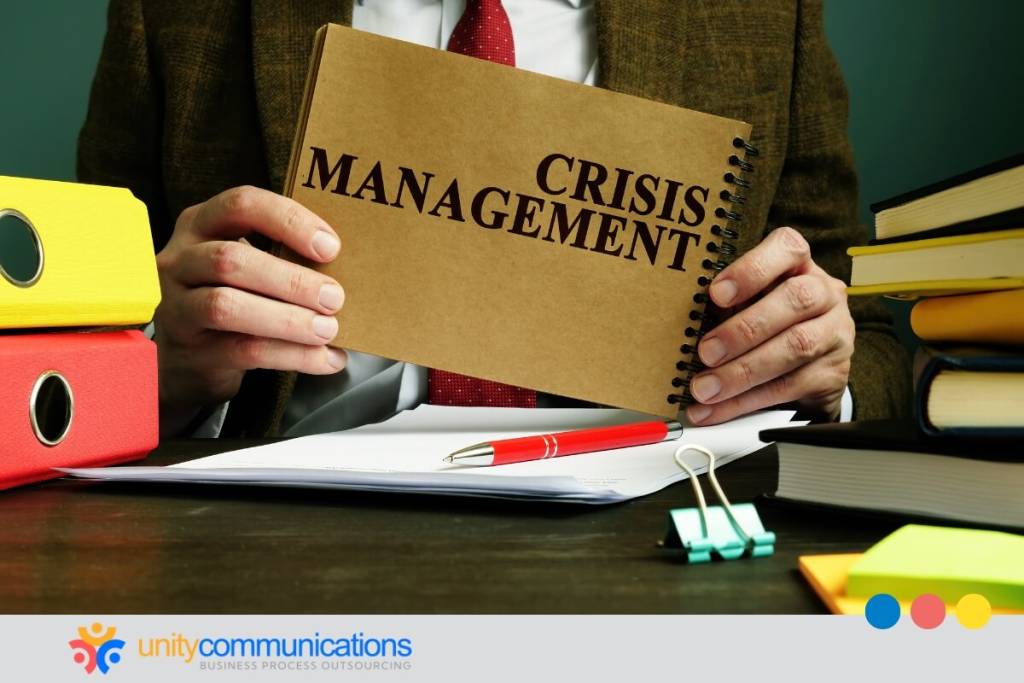Table of Contents
Strategic crisis management ensures resilience and continuity amid unforeseen events in the travel industry. Business process outsourcing (BPO) is a practical approach to enhance this dynamic sector’s crisis response capabilities.
In particular, travel BPO brings specialized expertise and scalable resources, enabling travel agencies to handle uncertainties effectively, minimize service interruptions, and maintain customer satisfaction.
This article explores how outsourcing optimizes and facilitates travel crisis management. Keep reading to discover key insights into leveraging external partnerships to boost readiness, maintain trust, and emerge stronger from disruptions.
The significance of crisis management in the travel industry

According to the World Travel & Tourism Council (WTTC), the travel and tourism industry will contribute over $11 trillion to the global economy in 2024, a record-breaking figure.
However, natural disasters, political instability, pandemics, and other crises pose risks to the travel sector. Effective crisis management combines methodical preparation and coordination to limit their effects and assure a quick recovery for the industry.
Let’s check in detail why crisis management is vital in the travel industry:
- Protects lives and safety. Effective crisis management prioritizes safety with evacuation plans, medical support, and communication, reducing panic and saving lives during disasters or political upheavals.
- Preserves brand reputation. Effective crisis management boosts business reliability and preparation, bolstering reputation and customer loyalty. Mishandling disasters can erode trust and harm the brand for a long time.
- Maintains financial stability. Proper crisis management minimizes losses from cancellations, booking declines, and emergency expenses. It improves the management of insurance claims and compensations during disruptions, stabilizing travel companies’ finances.
- Improves regulatory compliance. Effective travel crisis management enhances legal compliance, facilitates efficient dealings with authorities and international bodies, and prevents penalties.
- Enhances operational resilience. Crisis plans include backups and flexible strategies critical for service continuity in travel. This resilience upholds customer trust and allows businesses to continue operating during crises.
- Retains customer trust and loyalty. What is customer support experience in travel crisis management? It means extending consistent, reliable assistance to customers during challenging times to foster trust and loyalty.
Understanding the role of outsourcing in travel crisis management
Travel agencies require proactive preparation, response, and recovery measures to limit the effects of man-made and natural disasters. Travel crisis management aims to offer tourists and visitors safety, uphold the brand’s reputation, and maintain operational continuity during disruptions.
Challenges faced by travel agencies
Travel businesses confront several challenges during crises, including:
- Safety and security concerns. To protect travelers and employees during emergencies, timely evacuations, medical aid, and good communication of safety protocols are required.
- Operational disruptions. Crises frequently result in aircraft cancellations, hotel closures, and logistical issues, upsetting travel plans and causing financial losses.
- Reputation management. Mishandling emergencies can damage the agency’s reputation. Open communication and efficient crisis response are critical for building confidence with consumers and stakeholders.
- Regulatory compliance. During a crisis, travel companies must obey local and international safety regulations, which involve thorough planning and execution to avoid legal problems.
Outsourcing for specialized expertise and resources
What is BPO, and how does it support strategic crisis management in the travel industry? Outsourcing involves delegating operational tasks to service providers. These travel crisis management experts offer specialized expertise and resources for enhanced flexibility and service continuity during disruptions.
Travel agencies and similar businesses work with BPO providers to handle non-core services such as information technology (IT) support and customer care. As a result, they can concentrate on their primary operations and expansion efforts.
Here’s how outsourcing works in augmenting travel agencies’ crisis management capabilities:
- Emergency response services. Outsourcing firms have trained teams that swiftly coordinate evacuations, medical support, and communication strategies for effective travel crisis management.
- Vendor management. Outsourcing involves maintaining vendor relationships for operational continuity during a crisis. A BPO partner can work with other suppliers to assure seamless service delivery and supply chain resilience. They help reduce disruptions and maintain service standards.
- Legal and regulatory compliance. Third-party vendors versed in international regulations aid travel firms in dealing with legal complexities during crises. They handle insurance claims, comply with safety guidelines, and liaise with regulators to reduce legal risks.
- Customer support and communication. BPO firms offer exceptional customer service by communicating clearly with affected travelers during crises. This proactive communication helps mitigate panic, reassure customers, and maintain loyalty.
Advantages of outsourcing during travel disruptions

Outsourcing is crucial for increasing businesses’ resilience and travel crisis management capacities during disruptions. Keep reading to learn its benefits:
Access to advanced technology and systems
BPO partners typically have the latest technology infrastructure, such as artificial intelligence (AI), capable of real-time monitoring and predictive analytics. These platforms can predict emerging crises, allowing for proactive risk assessment and rapid reaction coordination.
Additionally, AI-driven algorithms that evaluate data trends and patterns assist travel agencies in anticipating issues and implementing preventative actions to protect customers while maintaining operational continuity.
Ability to scale support quickly
Customer support, emergency response, and logistical coordination requirements might change quickly during travel disruptions. BPO organizations specialize in scalable solutions, which allow travel companies to expand or delegate support services as needed.
Third-party teams trained in crisis management techniques can rapidly deploy resources for evacuations, medical aid, and communication plans. This agility means agencies can adjust to changing conditions while maintaining service quality and client satisfaction.
Cost efficiencies and focus on core functions
Transferring non-core functions, including customer service, administrative tasks, and IT management, to third-party providers allows travel and tourism firms to simplify operations and distribute resources more efficiently during emergencies.
Outsourcing allows agencies to cut the overhead costs of maintaining in-house personnel and facilities, contributing to effective travel crisis management. This cost-cutting strategy enables them to focus on emergency resolution operations, including maintaining client communication, enforcing safety protocols, and upholding regulatory compliance.
Integrating outsourcing into crisis management plans

Travel businesses must incorporate outsourcing into their crisis management plans to manage interruptions effectively. Here are the best ways to do so:
Choosing the right outsourcing partner for crisis management
Follow these tried-and-tested methods to pick the ideal BPO partner:
- Evaluate expertise and experience. Success in BPO in travel and tourism involves selecting your best business partner. Check its expertise and track record in crisis management. Seek partners with proven experience in the travel industry or similar sectors, offering valuable insights and effective strategies for handling disruptions.
- Check compliance and regulatory knowledge. Prefer a BPO partner knowledgeable about travel industry regulations. Its proficiency in compliance can help the firm tackle legal complexities during crises, minimize risks, and assure safety protocol adherence.
- Assess technological capabilities. A reliable outsourcing partner should have advanced tech infrastructure, including real-time monitoring, predictive analytics, and communication platforms for excellent travel crisis management. Examine if its technology aligns with your needs and integrates seamlessly with current systems.
- Review references and case studies. Ask for references and case studies to measure performance and reliability. Speaking with other clients gives an idea of the BPO provider’s crisis management qualifications and service effectiveness.
Key strategies for training and communication
Efficient training and communication enhance coordination, readiness, and crisis response. Apply these procedures:
- Develop clear communication protocols. These interaction guidelines help provide regular updates, real-time information sharing, and defined roles for efficient crisis coordination.
- Conduct joint training sessions. Regular joint training aligns the BPO team with the company’s crisis management plans. It covers emergency response, communication strategies, and scenario-based drills to prepare for disruptions.
- Implement a centralized crisis management system. This system must be accessible to the company and BPO vendor and store all crisis plans, contact lists, and protocols for unified information and swift action during a crisis.
- Establish a dedicated crisis management team. Form a dedicated crisis management team with the company and the third-party team. Meet regularly to review plans, discuss risks, and assess readiness.
Monitoring and evaluation of the outsourcing strategy
Proper tracking and assessment of the outsourcing strategy increases effectiveness, identifies gaps, and improves response capabilities during crises. Follow the recommendations below:
- Set clear metrics. Define key performance metrics (KPIs) such as response times, customer satisfaction, and incident resolution. Review them regularly to assess effectiveness and identify areas needing improvement.
- Conduct regular audits and assessments. Continuously audit the outsourcing strategy to monitor effectiveness and alignment with goals. Evaluate tech, communication, and training for continuous improvement.
- Collect and analyze feedback. Gather input from teams and customers to assess the BPO partner’s performance. Customer opinions and sentiments offer insights into crisis communication effectiveness for adjustments and improvements.
- Review and update crisis management plans. Frequently update crisis management strategies to reflect company and environmental changes and include outsourcing partners for proper alignment and readiness.
- Conduct post-crisis reviews. Run a thorough critique following a crisis to assess response and recovery efforts. Determine what worked effectively and what areas need improvement. Use these lessons to improve crisis management strategies and future preparedness.
The bottom line
Strategic crisis management in the travel industry maintains safety, reputation, financial stability, regulatory compliance, operational resilience, and customer trust during unexpected situations.
Leveraging outsourcing improves and strengthens travel businesses’ crisis management capabilities. BPO partnerships allow them to quickly access advanced technologies, reduce operating costs, and scale support during emergencies for operational continuity.
Let’s connect to learn more about how outsourcing can improve and facilitate travel crisis management. Unity Communications can help you optimize your crisis response strategies effectively!




